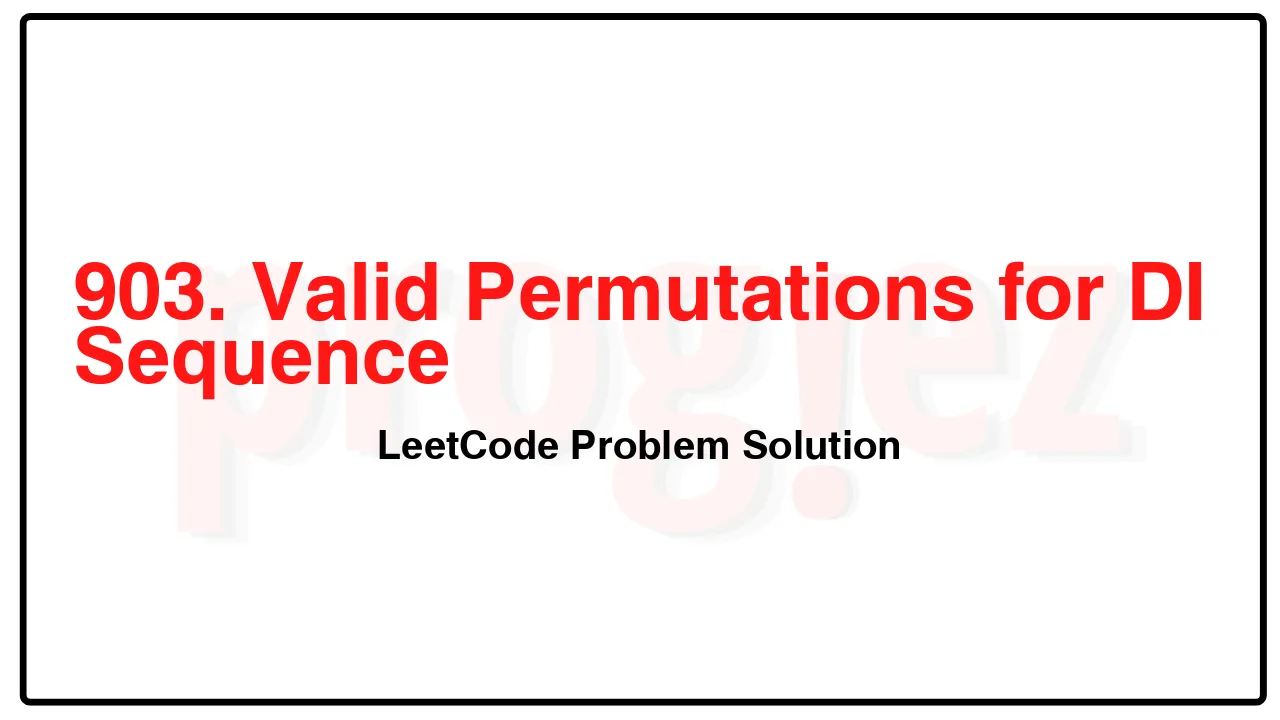903. Valid Permutations for DI Sequence LeetCode Solution
In this guide, you will get 903. Valid Permutations for DI Sequence LeetCode Solution with the best time and space complexity. The solution to Valid Permutations for DI Sequence problem is provided in various programming languages like C++, Java, and Python. This will be helpful for you if you are preparing for placements, hackathons, interviews, or practice purposes. The solutions provided here are very easy to follow and include detailed explanations.
Table of Contents
- Problem Statement
- Complexity Analysis
- Valid Permutations for DI Sequence solution in C++
- Valid Permutations for DI Sequence solution in Java
- Valid Permutations for DI Sequence solution in Python
- Additional Resources

Problem Statement of Valid Permutations for DI Sequence
You are given a string s of length n where s[i] is either:
‘D’ means decreasing, or
‘I’ means increasing.
A permutation perm of n + 1 integers of all the integers in the range [0, n] is called a valid permutation if for all valid i:
If s[i] == ‘D’, then perm[i] > perm[i + 1], and
If s[i] == ‘I’, then perm[i] < perm[i + 1].
Return the number of valid permutations perm. Since the answer may be large, return it modulo 109 + 7.
Example 1:
Input: s = “DID”
Output: 5
Explanation: The 5 valid permutations of (0, 1, 2, 3) are:
(1, 0, 3, 2)
(2, 0, 3, 1)
(2, 1, 3, 0)
(3, 0, 2, 1)
(3, 1, 2, 0)
Example 2:
Input: s = “D”
Output: 1
Constraints:
n == s.length
1 <= n <= 200
s[i] is either 'I' or 'D'.
Complexity Analysis
- Time Complexity: O(n^2)
- Space Complexity: O(n^2)
903. Valid Permutations for DI Sequence LeetCode Solution in C++
class Solution {
public:
int numPermsDISequence(string s) {
constexpr int kMod = 1'000'000'007;
const int n = s.length();
// dp[i][j] := the number of valid permutations with i + 1 digits, where
// s[i] is j-th Digit of remaining digits
vector<vector<int>> dp(n + 1, vector<int>(n + 1));
// When there's only one digit, the number of permutations is 1.
for (int j = 0; j <= n; ++j)
dp[0][j] = 1;
for (int i = 1; i <= n; ++i)
if (s[i - 1] == 'I') { // s[i - 1] == 'I'
// Calculate the postfix sum to prevent duplicate calculation.
int postfixsum = 0;
for (int j = n - i; j >= 0; --j) {
postfixsum = (postfixsum + dp[i - 1][j + 1]) % kMod;
dp[i][j] = postfixsum;
}
} else { // s[i - 1] == 'D'
// Calculate the prefix sum to prevent duplicate calculation.
int prefix = 0;
for (int j = 0; j <= n - i; ++j) {
prefix = (prefix + dp[i - 1][j]) % kMod;
dp[i][j] = prefix;
}
}
return dp[n][0];
}
};
/* code provided by PROGIEZ */903. Valid Permutations for DI Sequence LeetCode Solution in Java
class Solution {
public int numPermsDISequence(String s) {
final int kMod = 1_000_000_007;
final int n = s.length();
// dp[i][j] := the number of valid permutations with i + 1 digits, where s[i] is j-th
// Digit of remaining digits
int[][] dp = new int[n + 1][n + 1];
// When there's only one digit, the number of permutations is 1.
for (int j = 0; j <= n; ++j)
dp[0][j] = 1;
for (int i = 1; i <= n; ++i)
if (s.charAt(i - 1) == 'I') { // s[i - 1] == 'I'
// Calculate the postfix sum to prevent duplicate calculation.
int postfixsum = 0;
for (int j = n - i; j >= 0; --j) {
postfixsum = (postfixsum + dp[i - 1][j + 1]) % kMod;
dp[i][j] = postfixsum;
}
} else { // s[i - 1] == 'D'
// Calculate the prefix sum to prevent duplicate calculation.
int prefix = 0;
for (int j = 0; j <= n - i; ++j) {
prefix = (prefix + dp[i - 1][j]) % kMod;
dp[i][j] = prefix;
}
}
return dp[n][0];
}
}
// code provided by PROGIEZ903. Valid Permutations for DI Sequence LeetCode Solution in Python
class Solution {
public:
int numPermsDISequence(string s) {
constexpr int kMod = 1'000'000'007;
const int n = s.length();
vector<int> dp(n + 1);
// When there's only one digit, the number of permutations is 1.
for (int j = 0; j <= n; ++j)
dp[j] = 1;
for (int i = 1; i <= n; ++i) {
vector<int> newDp(n + 1);
if (s[i - 1] == 'I') { // s[i - 1] == 'I'
// Calculate the postfix sum to prevent duplicate calculation.
int postfixsum = 0;
for (int j = n - i; j >= 0; --j) {
postfixsum = (postfixsum + dp[j + 1]) % kMod;
newDp[j] = postfixsum;
}
} else { // s[i - 1] == 'D'
// Calculate the prefix sum to prevent duplicate calculation.
int prefix = 0;
for (int j = 0; j <= n - i; ++j) {
prefix = (prefix + dp[j]) % kMod;
newDp[j] = prefix;
}
}
dp = std::move(newDp);
}
return dp[0];
}
};
# code by PROGIEZAdditional Resources
- Explore all LeetCode problem solutions at Progiez here
- Explore all problems on LeetCode website here
Happy Coding! Keep following PROGIEZ for more updates and solutions.